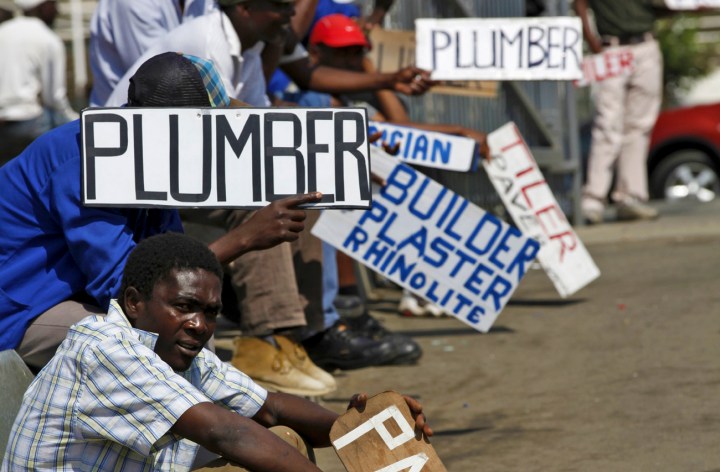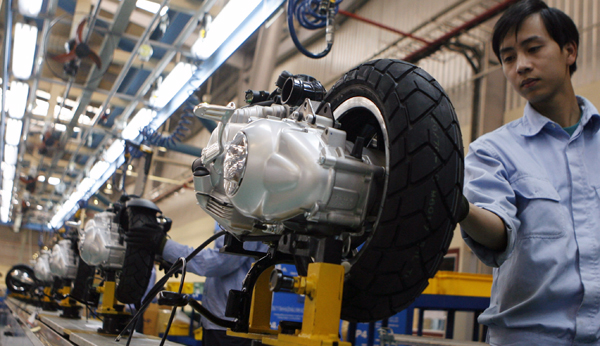Business Maverick, Politics
Analysis: Decent jobs vs any jobs – a global perspective

As government and the ANC debate how to create jobs, the unions are pushing hard for “decent work”. We’ve told them why they’re wrong before. This time, we’ve got numbers. By STEPHEN GROOTES.
My father always told me life wasn’t fair. As the eldest of three boys, he was usually referring to the fact that my cream-soda was poured last. It’s a comment that has come back to me time and again as this country discusses the issues around creating jobs, and “decent work”. In the Sunday Times, Cosatu general-secretary Zwelinzima Vavi again puts his case for “decent work” (meaning formal permanent jobs, with workers receiving benefits and all the protection of current and possible new labour laws). He again points out South Africa is the most unequal society in the world.
But, as he and other unionists have done many times over the last few months and years, he also misses the point entirely.
The fact is that to stop a revolution in this country, people need jobs. We’ve previously suggested our own brutal solution to this problem. For Vavi, “what annoys workers about this propaganda about ‘privileged employees’ is that it comes from the mouths of the real elite, the leaders of big business who have amassed fabulous fortunes and their well-paid spokesmen in the media universities”.
Fine, it’s always good to go ad hominem in a serious debate, there’s nothing like class envy. But here’s the real problem that faces South Africa. Our workers currently don’t have much to offer the world.
It’s that simple. For us to generate more work, we need to have something to sell. Money from minerals is nice, but it won’t create enough jobs. Therefore, goes the argument, we must industrialise, we must learn how to make things and sell them to everyone else. Sure. That makes sense, and it’s what we’re currently doing.
But that also misses the point. Nowadays, in a globalised economy, to be the workhouse of the world, you need to be cheaper, quicker and more productive than anyone else. And that means, competing with China and the rest of Asia. And we will continue to compete with them for the foreseeable future. For people in China’s Shenzen Province a salary of R840 a month is considered normal. And for those who think that sticking circuit boards together is not the height of workday excitement, instead of safety gear, all they get is a sign reading, “If you don’t work hard today, tomorrow you’ll have to try hard to find a job.”
That’s pretty good going actually. There have been claims the people putting together your iPod actually earn less. In 2006 one report suggested workers were getting just R350 a month. And that’s for a 15-hour day. (It could be one reason Julius Malema this week suggested “An iPhone is a stupid phone”. – Ed)
The iPod example may be extreme for China. But it’s commonplace for Vietnam. Which is where the world’s workshop is moving to, at the behest of Vavi’s “privileged elite”, the manufacturers. A salary of $50 (R350) a month is considered good going. People there work 48 hours a week for that – in a communist-party-run “workers’ paradise”, don’t forget.
Now compare that with the minimum wage of a machinist in a non-metro (i.e. rural area) region in South Africa. It’s hovering around the R2,000-a-month mark. That’s twice what a richer Chinese worker gets, and five times what a Vietnamese worker earns.

Photo: A man works at a Piaggio scooter and motorcycle factory in Vietnam’s northern Vinh Phuc province, outside Hanoi March 17, 2010. Piaggio SpA, the Italian company that makes the iconic Vespa scooters, has relocated its Asia headquarters to Vietnam from Singapore and will use the country of 86 million people as a springboard for growth in Asia, focusing on Southeast Asia. REUTERS/Kham
Our textile industry is the classic case of what happens when legislation gets in the way of capitalism. Thousands of jobs have been lost in the sector as factories have simply closed down. It is because it’s cheaper for Woolies to buy its clothes from China than to get them home-sewn. In Newcastle in KwaZulu-Natal thousands of people work for less than the minimum wage, because they have no choice. There’s been a dispute with the Chinese Chamber of Business there, after labour inspectors found that factories weren’t paying the minimum wage. But the factories argue they simply can’t afford it. Even the workers appear to have some sympathy for their bosses, as it’s obvious they’re struggling. And if no solution is found, if the minimum wage is forcibly implemented, the factories will close down.
Wanna guess where the jobs will go? Not China, not Vietnam. Lesotho. Yes, the “Mountain Kingdom” has a minimum wage for the same job in a similar textile industry of R630 a month. The workshops of the world are quite movable things.
So if we can’t make it like China, can we design it like California? Can we compete in the intellectual space, design, information processing, that kind of thing?
At this stage, obviously we cannot. We do not have the education system to take unskilled, uneducated people and transform them into information workers in a generation. Sometimes we despair thinking it will take more than two generations.
Which means we’re facing an awful truth. The only way to compete with Asia in manufacturing, to create jobs, may be to treat our workers worse than they do. Quite frankly, if nothing else keeps you awake at night about our country’s future, that should.
For this debate about job creation to be fruitful it has to be rooted in reality. The world’s economy is not fair and never will be. Which means we’re never to make as much, or create as many jobs as China and Asia are currently doing. But we can at the very least try to employ as many South Africans as possible. And the only way to do this is to make it easy to employ them. At least, they can then learn to fish for themselves over time rather than being force-fed the fish the state currently gives them in grants.
This debate cannot be about “decent work”. It has to be about creating any kind of work in the first place. Perhaps Cosatu should ask unemployed people. After all, they are purporting to represent them too. We think there’s a strong chance they’ll agree with the capitalists. DM
Grootes is an EWN reporter.
NB: For the purposes of this piece, US$1 equals R7.
Photo: Men hold placards offering temporal employment services in Glenvista, south of Johannesburg, October 7, 2010. REUTERS/Siphiwe Sibeko.



















 Become an Insider
Become an Insider